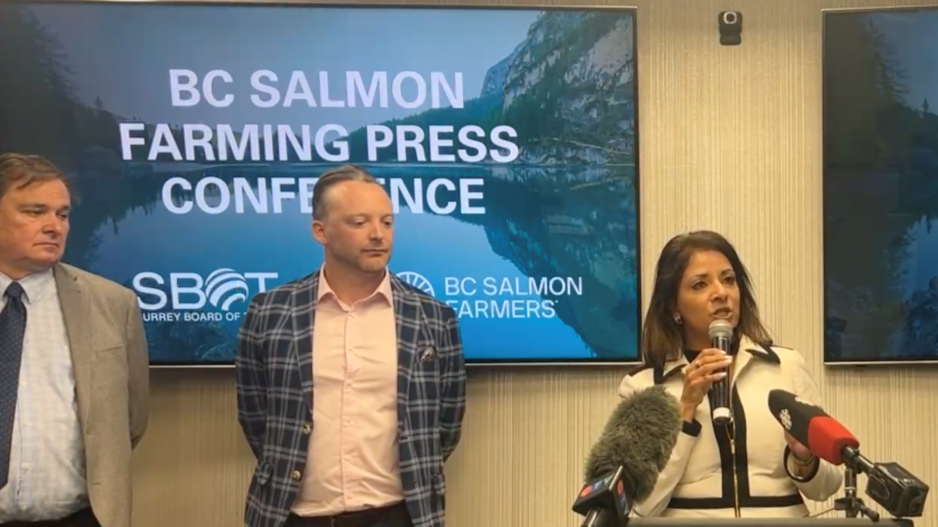A war of words has raged this week between fish farm supporters and opponents, with accusations of regulatory capture against Fisheries and Oceans scientists and staff and ideological capture against federal fisheries minister, Joyce Murray, who appeared to retreat this week by announcing a six-month delay to a final decision on open net salmon farms in B.C.
Both sides in the ideological battle expected Murray would announce a decision in June on what to do with the remaining open-net salmon farms that she hasn’t already shut down in B.C.
But according to the Globe and Mail, Murray has decided to delay her final decision by six months in order to extend consultation.
This morning, the First Nation Wild Salmon Alliance, which wants open-net salmon farms gone, held a press conference to raise concerns over what it sees as a softening of policy on open-net salmon farms, and at noon today the United Steelworkers Local 1-1937 planned to rally in Campbell River in support of fish plant workers in Port Hardy whose jobs are at risk if more salmon farms are forcibly shut down.
And earlier this week, the Surrey Board of Trade held a press conference warning of the economic impact of major job losses, if Murray forces all open-net salmon farms in B.C. to shut down.
Eighty fish processing plant jobs were already lost in Surrey last year as a result of a decision by Murray and her predecessor to shut down 15 open-net salmon farms in the Discovery Islands, said Surrey Board of Trade CEO Anita Huberman.
That took out 25 per cent of farmed salmon production in B.C.
Another 15 per cent was lost as a result of fish farm companies and the provincial government not renewing tenures in the Broughton Archipelago and Sechelt area due to First Nation opposition. The new provincial policy for provincial tenures is that fish farms must be supported by local First Nations before provincial tenures are issued or renewed.
Surrey is a salmon farming supply hub, with business that provide feed milling, fish processing, trucking, packaging, and other goods and services.
“We have seen the impacts the closures have had on our businesses in Surrey,” Huberman said. “Last year Mowi Canada West permanently closed their fish processing plant, which resulted in the loss of 80 direct jobs locally, and this isn’t the only example. There still has been no government action to support these workers.”
In recent days, the Coalition of First Nations for Finfish Stewardship warned that major fish farming companies may be planning to quit B.C., as it has simply become too risky.
“We have been warned by the salmon farming companies we partner with that any further reductions will eliminate the financial viability of the sector and could lead to the exit of the major salmon farming producers from British Columbia,” the coalition said in a press release. “The result, if approved, will be devastating to our many remote, coastal communities.”
Environmentalists opposed to open-net salmon farming, as well as a majority of coastal First Nations, blame open-net fish farms for the decline of wild salmon, and want them shut down.
First Nations opposed to open-net salmon farming worry that Murray’s original transition plan – which was assumed be a wholesale transition out of the water -- is being watered down. Bob Chamberlin, chairman of the First Nation Wild Salmon Alliance, accused DFO staff and scientists of regulatory capture in favour of the salmon farming industry.
“DFO staff continue to advance a one sided view to inform the ministers decision on fish farm transition,” Chamberlin said. “Even though a majority of First Nations are identified in the Phase 2 report, the substantial content is advancing an industry that is utterly incompatible with wild salmon.”
Chamberlin said he acknowledges that there may be other factors driving the decline of wild salmon in B.C. but believes salmon farms are a major cause of the decline.
“My opinion is that fish farms represent a very large and significant impact, and that’s why we’re working so hard to make sure food security for all First Nations is primary,” Chamberlin said.




